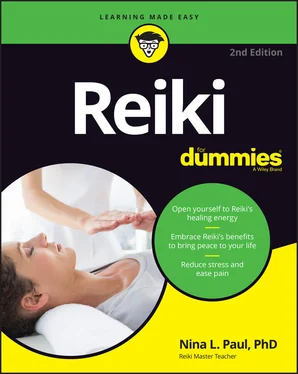A worrier is a person who’s concerned about things that may happen. The irony is that worry drains the mind and body of the energy it needs when problems actually do occur.
The best way to prepare for life’s situations — and life always thrusts some sort of challenge — is to be balanced and calm in mind, body, and spirit.
Developing a connection with Reiki spiritual healing reduces worry. You know you always have this power to help you, no matter what happens.
 Here are some tips to let go of worry:
Here are some tips to let go of worry:
Write down any worries or tell a friend (or therapist). Giving worries a “voice” allows them to be seen and heard. This may be all that you need to put this concern in perspective and find a solution.
Take action. If you’re worried about a person or situation, take helpful action. For example, if you’re worried about your son’s health, you can find a new health care provider or cook him healthy food to eat.
Pray. Constant worry indicates a lack of trust in Divine Intelligence. Work to strengthen your spiritual connection. Use prayer or distant Reiki (see Chapter 15) to send Reiki for any worries you might have.
Live in the present. Worry is about how past events might catch up with you and how future events might hurt you. What about right now?
Distract yourself from the worry. Talk to a friend, laugh at a movie, or get involved with your life. You can wash your kitchen floor, pet your dog, or go for a walk.
Most of the time, what you worry about never happens. Practicing the Reiki Principles regularly will keep you in better shape to handle the problems that do arise in your life.
 Appreciating what you have, no matter what it is, is essential for happiness. Here are some ideas to help you keep an attitude of gratitude:
Appreciating what you have, no matter what it is, is essential for happiness. Here are some ideas to help you keep an attitude of gratitude:
Keep a gratitude list or journal. Write down everything from the smallest things (like a hot bath) up to the larger things (such as the love of your life).
Give thanks before or after each meal. Thank the animals or plants who give their life energy, the farmers and suppliers, and the people who prepare your food. Give thanks to your digestive system, which converts this food to usable nutrients.
Make gratitude a habit. When you go to bed at night, take a mental note of what you’re thankful for in the day that’s just ended.
Cultivating a state of appreciation helps develop humility because you’re acknowledging that you’re dependent on help from other people and spirit.
Work is how you connect with the world around you and provide for the exchange of resources, commonly called money, that allows you to stay warm and well fed. Sometimes this Reiki Principle is stated as “work hard.”
Here are some questions to ask yourself about this Reiki Principle:
Am I honest in my dealings with my employers and clients? Am I working with integrity, or am I trying to cheat my employer?
Am I following my true calling? Many people are searching to know what their best job is. The best job is doing the utmost with what you’re doing right now. If and when it’s time to change, your inner voice or a clear message from the universe will let you know. Following the nudging of your inner voice can be scary because doing what you know already is comfortable. (You can practice self-Reiki to curb these fears; see Chapter 10.)
Am I honoring myself in my work? Working hard doesn’t mean abusing yourself. Knowing when to work late and when to rest is part of the art of living.
Am I using my gifts and talents? Work is more than paid 9-to-5 employment. You might also volunteer, raise children, and keep a home. You may have many different skills and abilities to use at different times and situations. For example, you might be a gifted musician and play gigs on weekends.
 The type of work you do isn’t as important as your attitude and dedication to the project. Remember: just for today.
The type of work you do isn’t as important as your attitude and dedication to the project. Remember: just for today.
The ultimate test when practicing a spiritual life is acceptance of and love for yourself and others. Being kind acknowledges that spirit is present in every living being. I had the opportunity to visit Japan for a scientific conference before I studied Reiki. One thing that impressed me was that people I passed in the street bowed to me, and I bowed to them. I was told that the concept behind this practice is that “the spirit in me sees the spirit in you.”
 As a starting point for having more compassion in your life, you can try these suggestions:
As a starting point for having more compassion in your life, you can try these suggestions:
Practice random acts of kindness. This great concept couples the act of compassion with humility. You need not tell anyone what you’ve done. An act of kindness can range from letting someone go ahead of you in the supermarket line, giving an anonymous gift, or maybe adding payment on expired parking meters.
Listen to people. Showing love for others is giving them what they want, not what you think they want.
Start by being kind to yourself. You can’t really love others if you don’t love yourself. By loving yourself, you also demonstrate to others how you expect to be treated.
By practicing this and the other Reiki Principles, you begin to see all beings as manifestations of spirit. Even if you have petty disagreements with someone else, being kind means practicing from the deeper knowledge that love is behind all people, even if they’re not aware of it. The funny thing about cultivating loving thoughts is that they have a way of growing and making the world a place filled with love and light.
 Love is the essence of Reiki.
Love is the essence of Reiki.
Incorporating the Reiki Principles into Your Daily Life
Upon reading the Reiki Principles earlier in this chapter, you may wonder what’s next. The principles are deceptively simple, but it takes effort to consistently live by these principles day in and day out. Spiritual growth is a lifelong process.
The Reiki Principles were originally intended to be chanted in Japanese in the morning and in the evening.
For the purists out there who want to hear or say the Reiki Principles in Japanese, check out www.reiki.org/learn-usui-principles-japanese . Soon you’ll be able to say the Reiki Principles in Japanese by yourself!
Some teachers may ask you to make a promise to uphold the Reiki Principles before or after receiving an attunement, which opens you to the Reiki energy. (See Chapter 7for more about attunements.) It’s up to you to decide how and when you will use the Reiki Principles in your life.
 The first part of the Reiki Principles states “just for today.” Do the best you can to practice these principles today. Tomorrow will be another today for starting over.
The first part of the Reiki Principles states “just for today.” Do the best you can to practice these principles today. Tomorrow will be another today for starting over.
 Here are some ways to use the Reiki Principles on a daily basis:
Here are some ways to use the Reiki Principles on a daily basis:
Читать дальше

 Here are some tips to let go of worry:
Here are some tips to let go of worry: The type of work you do isn’t as important as your attitude and dedication to the project. Remember: just for today.
The type of work you do isn’t as important as your attitude and dedication to the project. Remember: just for today.










